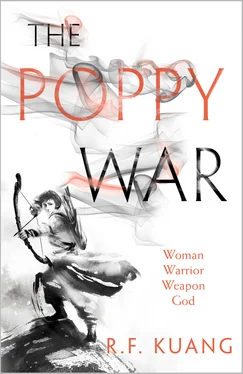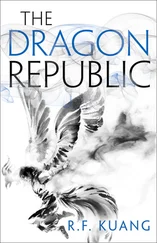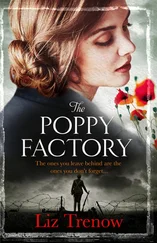Rin had always wondered whether the loss of Speer was purely an accident. If any other province had been destroyed the way Speer had, the Nikara Empire wouldn’t have stopped with a peace treaty. They would have fought until the Federation of Mugen was in pieces.
But the Speerlies weren’t really Nikara at all. Tall and brown-skinned, they were an island people who had always been ethnically separate from the Nikara mainlanders. They spoke their own language, wrote in their own script, and practiced their own religion. They had joined the Imperial Militia only at the Red Emperor’s sword point.
This all pointed to strained relations between the Nikara and the Speerlies all the way up through the Second Poppy War. So, Rin thought, if any Nikara territory had to be sacrificed, Speer was the obvious choice.
“We have survived the last century through nothing more than sheer luck and the charity of the west,” said Yim. “But even with Hesperia’s help, Nikan only barely managed to drive out the Federation invaders. Under pressure from Hesperia, the Federation signed the Non-Aggression Pact at the end of the Second Poppy War, and Nikan has retained its independence since. The Federation has been relegated to trading outposts on the edge of the Horse Province, and for the past nearly two decades, they’ve more or less behaved.
“But the Mugenese grow restless, and Hesperia has never been good about keeping its promises. The heroes of the Trifecta have been reduced to one; the Emperor is dead, the Gatekeeper is lost, and only the Empress remains on the throne. Perhaps worse, we have no Speerly soldiers.” Yim paused. “Our best fighting force is gone. Nikan no longer possesses the assets that helped us survive the Second Poppy War. Hesperia cannot be relied upon to save us again. If the past centuries have taught us anything, it is that Nikan’s enemies never rest. But this time when they come, we intend to be ready.”
The noontime bell marked lunch.
Food was served from giant cauldrons lined up by the far wall—congee, fish stew, and loaves of rice flour buns—distributed by cooks who seemed wholly indifferent to their jobs.
The students were given portions just large enough to sate their growling stomachs, but not so much that they felt fully satisfied. Students who tried to pass through the line again were sent back to their tables empty-handed.
To Rin, the prospect of regular meals was more than generous—she’d frequently gone without dinner in the Fang household. But her classmates complained to Raban about the single portions.
“Jima’s philosophy is that hunger is good. It’ll keep you light, focused,” explained Raban.
“It’ll keep us miserable,” Nezha grumbled.
Rin rolled her eyes but kept her mouth shut. They sat crammed in two rows of twenty-five along the wooden table near the end of the mess hall. The other tables were occupied by the apprentices, but not even Nezha had the nerve to attempt to sit among them.
Rin found herself crammed between Niang and the wiry-haired boy who had spoken up in History class.
“I’m Kitay,” he introduced himself, once he’d finished inhaling his stew.
He was one year her junior and looked it—scrawny, freckled, with enormous ears. He also happened to have achieved the highest Keju score in Sinegard Municipality, by far the most competitive testing region, which was especially impressive for someone who had taken it a year early. He had a photographic memory, he wanted to study Strategy under Master Irjah once he got past the Trials, and didn’t she think Jun was kind of an asshole?
“Yes. And I’m Runin. Rin,” she said, once he let her get a word in.
“Oh, you’re the one Nezha hates.”
Rin supposed there were worse reputations to have. In any case, Kitay didn’t seem to hold it against her. “What’s his problem, anyway?” she asked.
“His father is the Dragon Warlord and his aunts have been concubines to the throne for generations. You’d be a prick too if your family was both rich and attractive.”
“Do you know him?” Rin asked.
“We grew up together. Me, Nezha, and Venka. Shared the same tutor. I thought they’d be nicer to me once we were all at the Academy.” Kitay shrugged, glancing at the far end of the table, where Nezha and Venka appeared to be holding court. “Guess I thought wrong.”
Rin wasn’t surprised that Nezha had cut Kitay out of his social circle. There was no way Nezha would have stuck around anyone half as witty as Kitay—there were too many opportunities for Kitay to upstage him. “What’d you do to offend him?”
Kitay pulled a face. “Nothing, except beat him on the exam. Nezha’s prickly about his ego. Why, what did you do?”
“I gave him that black eye,” she admitted.
Kitay raised an eyebrow. “Nice.”
Lore was scheduled for after lunch, and then Linguistics. Rin had been looking forward to Lore all day. But the apprentices who led them to the class looked like they were trying not to laugh. They climbed the winding steps to the fifth tier, higher up than any of their other classes. Finally they stopped at an enclosed garden.
“What are we doing here?” Nezha asked.
“This is your classroom,” said one of the apprentices. They glanced at each other, grinned, and then left. After five minutes, the cause of their amusement became clear. The Lore Master didn’t show. Ten minutes passed. Then twenty.
The class milled around the garden awkwardly, trying to figure out what they were supposed to do.
“We’ve been pranked,” suggested Han. “They led us to the wrong place.”
“What do they grow in here, anyway?” Nezha pulled a flower down to his nose and sniffed it. “Gross.”
Rin took a closer look at the flowers, then her eyes widened. She’d seen those petals before.
Nezha recognized it at the same moment that she did.
“Shit,” he said. “That’s a poppy plant.”
Their class reacted like a startled nest of dormice. They scurried hastily away from the poppy plant as if mere proximity would get them high.
Rin fought the absurd urge to burst out laughing. Here on the other side of the country was at least one thing she was familiar with.
“We’re going to be expelled,” Venka wailed.
“Don’t be stupid, it’s not our poppy plant,” Kitay said.
Venka flapped her hands around her face. “But Jima said if we were even within ten paces of—”
“It’s not like they can expel the entire class,” Kitay said. “I bet he’s testing us. Seeing if we really want to learn.”
“Or testing us to see how we’ll react around illegal drugs!” Venka shrilled.
“Oh, calm down,” Rin said. “You can’t get high just by touching it.”
Venka did not calm down. “But Jima didn’t say she had to catch us high, she said—”
“I don’t think it’s a real class,” Nezha interrupted. “I bet the apprentices are just having their bit of fun.”
Kitay looked doubtful. “It’s on our schedule. And we saw the Lore Master, he was at orientation.”
“Then where were his apprentices?” Nezha shot back. “What color was his belt? Why don’t you see anyone walking around with Lore stitched into their armbands? This is stupid.”
Nezha stalked out through the gates. Encouraged, the rest of the class followed him out, one by one. Finally Rin and Kitay were the only ones left in the garden.
Rin sat down and leaned back on her elbows, admiring the variety of plants in the garden. Aside from the blood-red poppy flowers, there were tiny cacti with pink and yellow blossoms, fluorescent mushrooms glowing faintly in the dark corners under shelves, and leafy green bushes that emitted a tealike odor.
“This isn’t a garden,” she said. “This is a drug farm.”
Читать дальше












